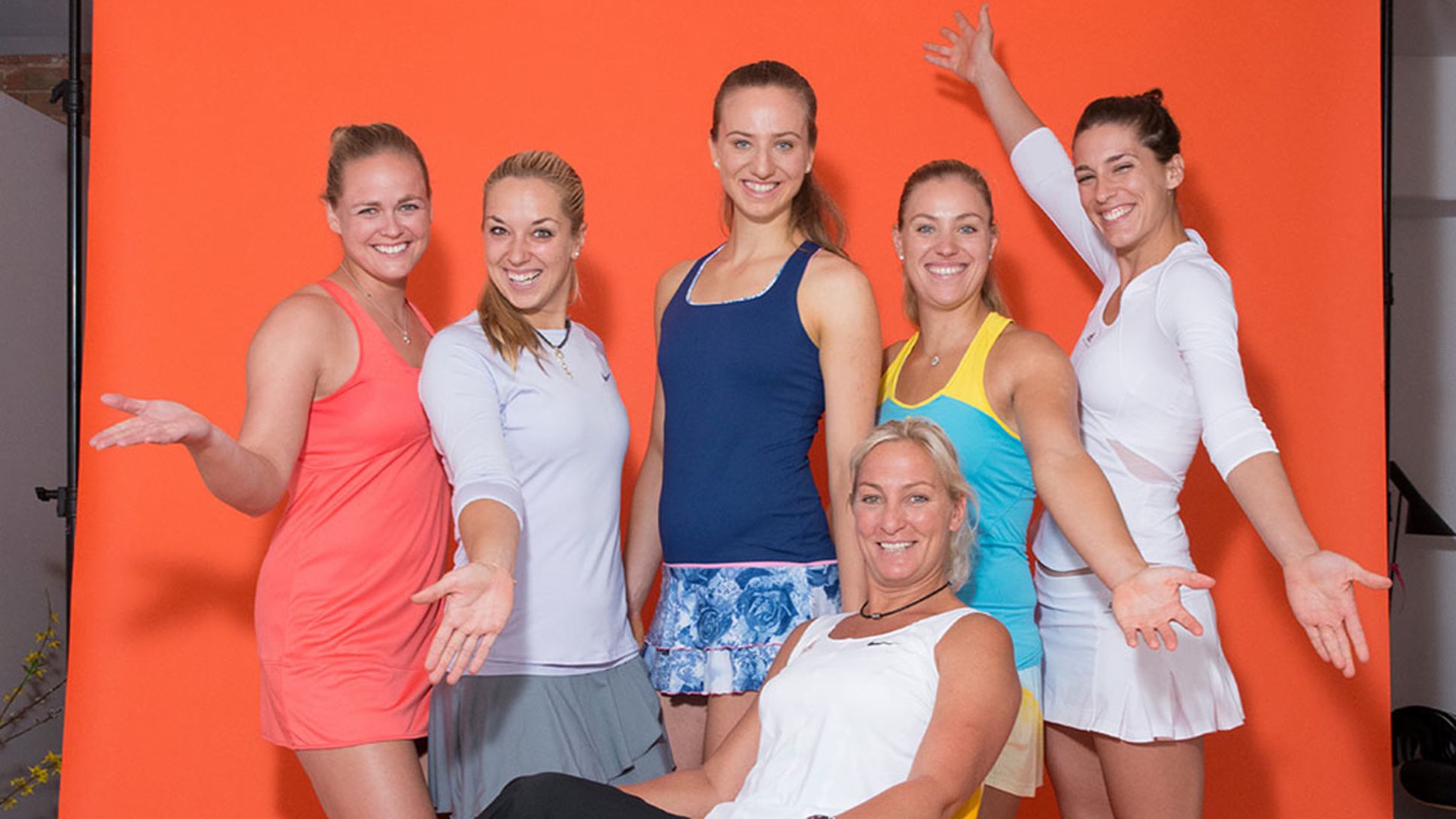When she thinks about friendships in tennis in a quieter moment, Andrea Petkovic is "flabbergasted" each and every time. For one, "that they really and actually exist". And then, "that such relationships can survive even very difficult, sensitive situations". Petkovic, once the leader of the German "fräuleinwunder", does not want to give a "lecture in theory" here. She refers to her "own experience", the "great Fed Cup troupe" and her special, "truly wonderful friendship" with Angelique Kerber, who has now become the number 1 in German women's tennis. "Angie is one of the few people, to whom I would entrust absolutely any secret," says Petkovic.
Granted, there are those doubting Thomases who question the depth of harmony and concord on the Porsche Team Germany – there are no revelations to be had, no back story to this story of an extraordinary unity. Instead, there is a great sense of community that has evolved across the lifelines and career biographies of these young women making up the intact team representing the black, red and gold flag. The absence of petty jealousies, egotism and vanity is attributed by somebody like Petkovic to the fact that "we just like one another". But she has another idea to explain "why we are such a cheerful girls combo, why the atmosphere is so awesome": "All of us, not only Angie and I, have very strong egos. But we are all about the same age and have learned over all these years since childhood and our teenage days that, in tennis, you are sometimes more in the front, sometimes more behind. Competition is accepted: it is not a threat but motivation. You want to perform better than the others."
So many characters, so many stories, so much fun
Without great effort, these protagonists of the most successful German generation of tennis players since the time of Steffi Graf and Anke Huber are able to accept one another with all their differences. For one, there's Kerber, the rock-solid, modest, unassuming front woman, who says that "she doesn't have to read her name in the paper every day" unless it's related to her athletic achievements. Then there is Wimbledon finalist Sabine Lisicki, the blonde Berlin native nicknamed "Bum Bum Bine", who is not disinclined in any way to glitter, glamour and red carpets. Then there is Petkovic, the team's feisty spokeswoman, a young lady who comes up with the most amazing and deep ruminations about God, the world and her tennis playing. Julia Görges, the woman from Northern Germany, whose cool intelligence strangely contrasts with her emotional and intensely volatile playing. There are the highly gifted up-and-comers Mona Barthel and Annika Beck, who, after top-flight school graduations, are now exploring the world of the travelling tennis circus. And last but not least, there's the life of the party, who is almost from a different tennis era: Anna-Lena Grönefeld, who now lives in Saarland and is in great demand as a seasoned doubles specialist. "So many characters, so many stories, so much fun and joy to work with all of them", says Barbara Rittner, the Fed Cup head. She doesn't have to "make things up and paint things rosy", says Rittner in order to express that view: "They are a tightly knit bunch. They get on great with one another and are focused on their goal as a team: namely, to fetch home the cup finally."
But isn't tennis often and with relish described as a conglomeration of ego shooters, a branch of sports where everybody is very charitable, because for everybody charity begins at home? How do all the typically German romantic ideas about friendship fit into this apparent community of pure envy, described time and again as a pack of wolves and she-wolves? "Envy?" Petkovic asks rhetorically whenever she hears about such suspicions, "What does envy mean to me?" And she answers: "If you define envy to be about something that I also would like to achieve in tennis, then I am envious. I would like to be in a Grand Slam quarter-final again and be among the top ten. Sure thing! But I don't define envy to be about something that you begrudge others. I wouldn't dream of it.
"When one of us does something great, then we all share her joy."
But does that apply to the others as well, that is to say, to the other ladies on Porsche Team Germany? Petkovic doesn't hesitate, doesn't even need a second to consider: "That goes for everybody on our team, I guarantee." Kerber takes the same line: "When one of us does something great, like Sabine Lisicki did last year in Wimbledon, then we all share her joy. At the same time, a success like that is a motivation to do something equally great." Lisicki says she felt during her Wimbledon mission the special affection and friendship on the part of her team mates; in match after match, they cheered her on from near and far: "With us, 'team' is not just something you put on a track suit. We live the concept." Nor does it present any problem when they compete against one another, Görges says: "I don't start disliking somebody because I lost a match against her. You have to keep the two things apart, separate the emotions from one another."
Exemplary for the German project of togetherness in the divisive world of tennis is the story of the two friends Petkovic and Kerber. A strange prologue to the friendship is the fact that it was Petkovic who set Kerber on the right track with an invitation to the Offenbach training camp in 2011. "Without Andrea, I wouldn't be where I am today", says Kerber, "she pulled me from a deep hole I had climbed into." And from the despair of not knowing any longer how she would "get going in terms of career". And from thoughts "of getting out because nothing made any sense any longer". An entirely changed Kerber made her appearance in the US Open, one with more courage, more fitness, more stamina. And with the knowledge "that I can do something really great if I would only believe in myself". She outperformed her friend and supporter already in this tournament. Albeit this was also due to a lucky draw, nobody spoke of coincidences after a while. Not the fans, not the experts. Not Kerber herself. And, certainly, not national coach Rittner. But neither did Petkovic.
"Our friendship became even deeper."
That autumn almost three years ago, many still expected much from this young woman from Hesse who in a desperate but vain endeavour attempted to seize a ticket for the World Championship, while Kerber's steady, persistent, unstoppable rise was already happening in her slipstream. Both ladies, whose characters are so different, had no problem with the emerging new hierarchy in the tennis world, the transformed sports pecking order. "Our friendship became even deeper", says Petkovic, "amazing, isn't it? But we allow ourselves only the nicest and best things. Why should there be a problem for me in accepting Angie as the better athlete now? I have enough self-confidence to look only at myself." Petkovic is so tactful and generous not to reveal that the main reason for her slippage in rankings was that two jinxed years lay behind her, as she suffered one serious injury after another.
Petkovic even contemplates (not altogether earnestly) whether something is rotten in the tennis state of Germany with the girls' clique as it is: "Yes, sometimes I think: Ought there not be at least one person who kicks up a row every once in a while? Because when losing with this team, it is hard to discover a reason why it didn't work out." But then, in the very next moment, the team's keenest thinker says: "We all had difficult times over the last few years. Each one of us has had a major slip-up as number 1 of the team. But we all got stronger from the defeats. Now we're quite ready for something great."
The "We" simply has to be decisive. Sooner or later.

